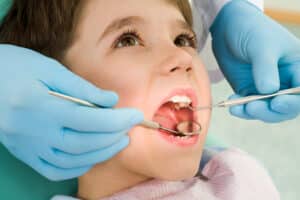
What Are Canker Sores?
Canker sores, also known as aphthous ulcers, develop in certain areas of a child’s mouth. They can occur inside the cheeks, lips, base of the gums, and tongue. These sores aren’t contagious like cold sores are, and a viral infection does not cause them. While they are usually mild, some children end up needing treatment for these sores.
They appear as small, round, yellow sores with red rings around them. In most cases, they pop up as one singular sore; however, they can appear in clusters.
Can Toddlers Get Canker Sores?
You may be wondering if toddlers can get canker sores. In short, anyone can get canker sores. Although they occur more often in children and young adults who are in their early 20s, no one is immune. Furthermore, females have a higher chance of getting canker sores than males.
Unfortunately, it can be especially difficult when your toddler gets a canker sore, as it can make it uncomfortable for them to eat and brush their teeth as usual, which can impact their routine.
What Causes Canker Sores in Kids?
The exact cause of canker sores in children isn’t fully known. However, there are some factors that could contribute to them, such as a diet low in folic acid, vitamin B12, iron, or other nutrients. Other risk factors that can increase a child’s chance of having canker sores include mouth trauma or injuries. Furthermore, children who bite their lips might be at a higher risk of developing canker sores.
What Are the Symptoms of Canker Sores in a Child?
These are some of the most common symptoms of mouth sores in kids:
- A yellowish sore or cluster of sores inside the mouth.
- A stinging, burning, or tingling sensation at the site of the sore.
- Difficulty eating, chewing, and even speaking without pain or discomfort
In severe cases, symptoms may include a fever or swollen lymph nodes. Generally, canker sores in toddlers only last around two weeks. If you’re unsure whether it’s a canker sore or not, bring your child to Park View Pediatric Dentistry. We can provide a proper diagnosis as well as some solutions for reducing discomfort.
How Are Canker Sores Diagnosed in a Child?
If your child has a canker sore for longer than two weeks, it may be time to bring them to a doctor for proper diagnosis and treatment. Doctors can usually diagnose canker sores by looking at them and going over a child’s medical history. These tests are generally only done if your child repeatedly gets canker sores or if their canker sores are severe.
How Are Canker Sores in Children Treated?
Canker sores don’t necessarily need treatment. Some of these sores end up going away on their own, although this can take a couple of weeks to happen. In the meantime, your dentist can recommend ways to relieve any pain or discomfort that these sores are causing your child. Some of these might include avoiding salty foods and other foods that could irritate sores and brushing with a soft-bristled toothbrush.
They can also provide you with a prescription ointment, which must be applied directly to the canker sore. After applying the medication, make sure your child does not eat or drink for at least 30 minutes.
How Can I Assist My Child While They Have a Canker Sore?
While canker sores in toddlers usually resolve on their own, they can be uncomfortable and even painful during the time your child has one. Thankfully, you can do a few things to relieve these symptoms until the canker sore has cleared up.
We recommend avoiding any foods that are hard, crunchy, or abrasive, as they can rub against and irritate the canker sore, causing further discomfort. Furthermore, salty, spicy, or acidic foods, such as chips, citrus fruits, and juices, can increase tingling and burning sensations. Instead, opt for soft foods, such as yogurt, cottage cheese, lightly seasoned and tender meats, or cream soups (allow them to cool first).
In addition, encourage your child to brush their teeth gently and provide them with a soft-bristled brush. This is especially important if the canker sore is located on the gums.
If approved by your provider, you can also provide your child with acetaminophen (Tylenol) or Ibuprofen to reduce their pain or discomfort.
There are some topical anesthetics and mouth rinses that can help; however, you should speak with your provider before assuming these are safe for your toddler to use.
When Should I See a Doctor for Canker Sores in My Child?
You should see a doctor or dentist for canker sores if these sores are severe or if your child gets them often. You should also see a doctor or dentist if your child’s canker sores aren’t going away or improving, even after a couple or a few weeks of treatment. They might recommend a different form of treatment, such as topical medicine.
Schedule an Appointment With Park View Pediatric Dentistry
If your child has canker sores and requires treatment in New York, NY, schedule an appointment today with Park View Pediatric Dentistry. Our entire staff will make sure you and your child feel welcome and comfortable in our child-friendly office. Contact our office today at 212-879-6518 or submit a contact form online.
